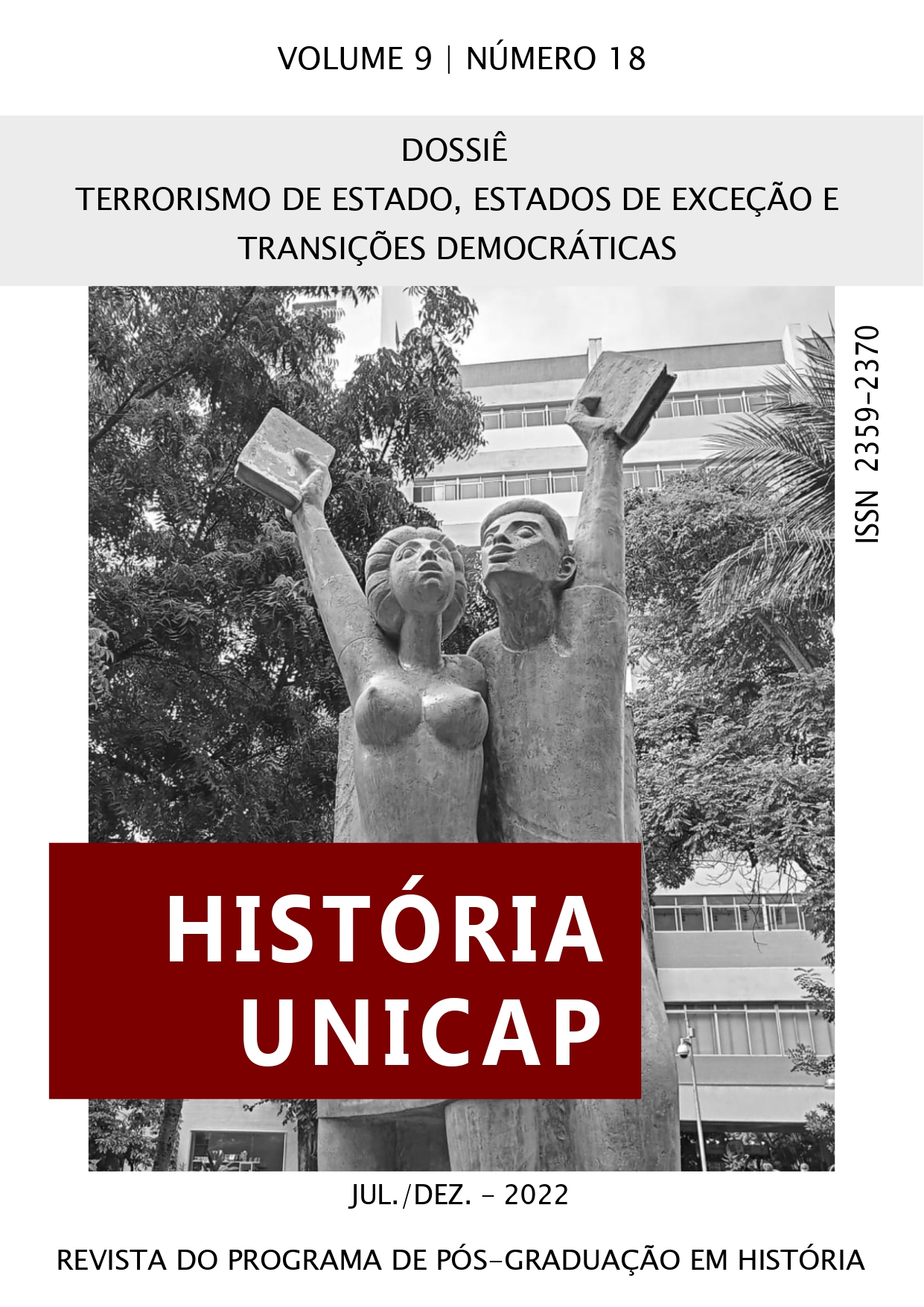Dictatorial silences and resistance
DOI:
https://doi.org/10.25247/hu.2022.v9n18.p132-144Keywords:
State terrorism, Imperialism, DependencyAbstract
Different silences have covered up the political violence perpetrated by the state during the dictatorships of the Latin American Southern Cone. The literature that has dealt with this period of recent history is evidence of this, as are the testimonies of survivors of the Chilean and Argentinean dictatorships. This paper seeks to deepen and analyse the silence of the survivors, both during the concentration camp experience and the silence that exists once political imprisonment has ended, by reviewing the literature and analysing testimonies.
In order to explore this in greater depth, it has been decided to present the silences based on what are considered to be moments of the concentration camp experience during the Argentinean and Chilean dictatorships. It is understood that there are at least two main moments: one, the political imprisonment experienced in clandestine detention centres, which begins with the detention and extends until the prisoner's recognition-appearance, which can happen either with the transfer from the illegal detention centre to a prison or another instance of legal imprisonment, or with apparently unrestricted freedom. The second is that which begins with the exit from the illegal detention centre, giving way to a different process that does not necessarily imply an end to the concentration experience, above all because of the silence in which the experience is kept.
One of the silences identified in the literature is related to sexual torture. This work highlights that women former political prisoners have managed to face a series of difficulties in denouncing and talking about this type of violence. It is different in the case of men, where such violence is still covered by a cloak of silence.
Downloads
References
AGAMBEN, Giorgio. Lo que queda de Auschwitz. El archivo y el testigo Horno Sacer III. Valencia: Pre-Textos, 2000.
ÁLVAREZ, Victoria. "¿No te habrás caído?" La experiencia concentracionaria durante la última dictadura (1976-1983) desde una perspectiva de género. Memorias y marcos sociales de la escucha entre la dictadura y la transición a la democracia. 2017. Disponible en: https://www.memoria.fahce.unlp.edu.ar/art_revistas/pr.7904/pr.7904.pdf
ÁLVAREZ, Victoria. Testimonios sobre la violencia sexual e (im)posibilidades de escucha en el juicio a las juntas. [S.l.], 2018. Disponible en https://static.ides.org.ar/archivo/www/2012/04/7-ALVAREZ.pdf.
BECKER, Nubia. Una mujer en Villa Grimaldi. Santiago - Chile: Pehuén Editores, 2012.
CALVEIRO, Pilar. Poder y desaparición: los campos de concentración en Argentina. Buenos Aires: Ediciones Colihue S.R.L, 2004.
FORCINITO, Ana. Los umbrales del testimonio: entre las narraciones de los sobrevivientes y las señas de la posdictadura. Los umbrales del testimonio, p. 1-179, 2012.
HERRMANN, Gina. “They Didn’t Rape Me”: Traces of Gendered Violence and Sexual Injury in the Testimonies of Spanish Republican Women Survivors of the Franco Dictatorship. In: Tapestry of Memory: Evidence and Testimony in Life-Story Narratives. Routledge, 2017. p. 77-96.
HINER, Hilary; CASTRO, Daniela. Testimonios televisados: narrativas de violencia política sexual en la televisión chilena. 2018. Disponible en https://static.ides.org.ar/archivo/www/2012/04/5-HINER.pdf
JELIN, Elisabeth. “La narrativa personal de lo ‘invisible”. Em: CARNOVALE, Vera; LORENZ, Federico; PITTALUGA, Roberto (edit.). Historia, Memoria y Fuentes Orales. Buenos Aires: Cedinci, 2006, 63-79.
JOFFILY, Mariana. Sexual Violence in the military dictatorships of Latin America: Who wants to know?. 2016. Disponible en https://sur.conectas.org/es/quien-quiere-saber/
LLANOS, Bernardita. Género, violencia sexual y delito en Carne de perra de Fátima Sime. 2017. Disponible en https://dialnet.unirioja.es/servlet/articulo?codigo=6238128
MACÓN, C. Giro afectivo y reparación testimonial: El caso de la violencia sexual en los juicios por crímenes de lesa humanidad. Mora, Buenos Aires, v. 21, n. 1, p. 63-88, 2015.
MARTÍN-BARÓ, Ignacio. Guerra y salud Mental. En Baró. I. Psicología Social de la Guerra: Trauma y Terapia. San Salvador: UCA Editores, 1990
PALESTRO, Sandra. Violencia Sexual en la tortura contra mujeres: un silencio con historia. Em: ÁGUILA, E. Mujeres y Violencia: silencios y resistencias. Santiago: Red Chilena contra la Violencia hacia las Mujeres, 2013.
SANTOS, José. La tortura: Todo es cuerpo, 2015. Disponible en http://revistas.academia.cl/index.php/academia/article/view/51.
SANTOS, José. Los silencios de la tortura en Chile. 2020. Disponible em: http://ojs.uc.cl/index.php/rcp/article/view/10248.
SEGATO, R. La guerra contra las mujeres. Madrid: Traficante de sueños, 2016.
SONDERÉGUER, M. Perspectiva de género y narrativa legal: sexualidad y poder en las políticas de memoria y justicia en Argentina. Em: BILBIJA, K.; FORCINITO, A.; LLANOS, B. Poner el Cuerpo: rescatar y visibilizar las marcas sexuales y de género de los archivos dictatoriales del Cono Sur. [S.l.] – Chile: Editorial Cuarto Propio, 2017. p. 201- 216.
TOWNSEND, Brandi. The Body and State Violence, from the Harrowing to the Mundane: Chilean Women´s Oral Histories of the Augusto Pinochet Dictatorship (1973-1990). Journal of Women's History, v. 31, n. 2, p. 33-56, 2019. Disponible en https://muse.jhu.edu/article/726982/summary
TUBERT, Silvia. Malestar en la palabra. El pensamiento crítico de Freud y la Viena de su tiempo. Madrid: Editorial Biblioteca Nueva, S.L., 1999.
Downloads
Published
Issue
Section
License
Copyright (c) 2023 HISTÓRIA UNICAP

This work is licensed under a Creative Commons Attribution 4.0 International License.
Concedo a Revista História Unicap o direito de primeira publicação da versão revisada do meu artigo, licenciado sob a Licença Creative Commons Attribution (que permite o compartilhamento do trabalho com reconhecimento da autoria e publicação inicial nesta revista).
Afirmo ainda que meu artigo não está sendo submetido a outra publicação e não foi publicado na íntegra em outro periódico e assumo total responsabilidade por sua originalidade, podendo incidir sobre mim eventuais encargos decorrentes de reivindicação, por parte de terceiros, em relação à autoria do mesmo.
Também aceito submeter o trabalho às normas de publicação da Revista História Unicap acima explicitadas.















 A História Unicap está licenciada com uma licença
A História Unicap está licenciada com uma licença 